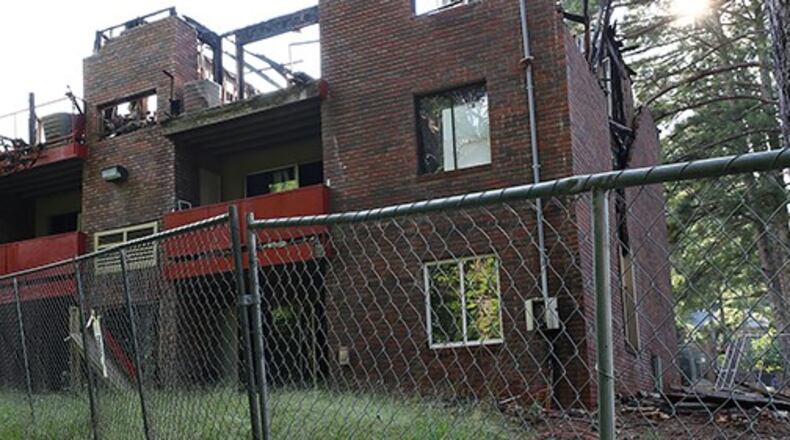The Georgia Senate on Thursday passed a bill enshrining modest standards for people living in neglected rental homes — though affordable housing advocates say more must be done to protect against unscrupulous landlords.
House Bill 404 passed 44-2. Since the Senate amended the bill to update the effective date, it will now go back to the House for consideration. The House is expected to approve the measure next week.
The bill’s passage could represent a hard-won victory for lawmakers, policymakers and housing advocates, some of whom highlighted the measure’s shortcomings but argued it was an important step in the right direction.
The law would create a habitability standard, a three-day grace period so tenants can catch up with their rent before landlords file for eviction, and place limits on security deposits to the equivalent of two months’ rent.
Rep. Kasey Carpenter, a Dalton Republican and lead sponsor, proposed the bill on the back of The Atlanta Journal-Constitution’s 2022 investigation, “Dangerous Dwellings.” The six-part series exposed dangerous conditions — including rats, mold, raw sewage, roaches and violent crime — at hundreds of Atlanta-area housing complexes.
He said the legislation will help protect renters from landlords and management companies who let their properties fall into disrepair or harass and mistreat tenants.
State Sen. Brian Strickland, a McDonough Republican who sponsored the bill in the Senate, said stakeholders had worked together over the past year and a half “to codify some, what I would call, common sense standards.”
The bill states rental properties should be “fit for human habitation” without making clear what habitable or uninhabitable means, and what penalties landlords would face for non-compliance.
Carpenter said he hoped the bill would “empower” tenants to withhold rent if landlords fail to make repairs or try to end their leases if their homes are unlivable. But he said it was up to renters to enforce their rights and for courts or local governments to interpret the law and impose penalties.
“At the end of the day, if a landlord wants to be a jerk and try to strong-arm you and hire an attorney, the law is on your side,” he said.
Chelsea Juras, vice president of strategic initiatives for the Atlanta Apartment Association, which represents companies managing hundreds of thousands of apartments, said the industry group was “not opposed” to the bill.
Georgia has some of the weakest tenant protections in the country, according to some affordable housing advocates. Elizabeth Appley, an Atlanta-based lawyer and public policy advocate who rallied support for the bill, said this leads to high eviction rates and an increase in the number of people without housing.
The impact of evictions can hit hardest among Black and low-income communities and the most vulnerable, including people with disabilities, seniors and children.
Still, the bill was not without critics. Some reform-minded housing experts wanted stricter limits on security deposits. Others wanted a longer grace period before landlords could move to evict tenants.
Alison Johnson, executive director of the Atlanta housing advocacy group, Housing Justice League, said the legislation only put “a band-aid on a much bigger wound.”
“We need to do real surgery on how we think about housing people, and particularly … working class and poor people,” she said. “The lack of affordable housing causes people to be in positions where they are having to accept housing that is less safe for them and conditions that are terrible for their children.”
Johnson said the law will be significant but progress was much too slow. She hoped the legislation would spur further action on the high rents that Georgians face, and lead to rent controls. According to Zillow, as of March the median rent in Atlanta for a one-bedroom, for instance, is $1,650, and more than $2,100 for a two-bedroom.
“Tenants need to be protected today,” she said before the legislation passed the Senate. “We can’t wait every five years for tenant protection policy to pass. It’s egregious.”
Latresa Chaney lived in the neglected Forest Cove Section 8 apartment complex from 2013 to 2019 and was a tenant organizer there. She had supported the legislation because of her struggles to find safe, affordable housing.
At first, moving to Forest Cove with her five children was a “blessing” after living in a women’s shelter. But within weeks, she realized that her unit was infested with roaches and mold, and the blighted 22-acre site attracted drug dealers and violent crime.
“I found it hard to breathe, sleep, eat … It was a lot,” she said.
Without HB 404, a landlord could move to evict a tenant for late payment or non-payment without notice, Appley said. A tenant can be on the hook for hundreds of dollars in legal fees and left with a black mark on their rental history that can make it even harder to find affordable housing.
“They end up in those extended stay motels or unable to rent even a subpar property,” she said.
Meanwhile, Taylor Shelton, an expert on housing issues and an assistant geography professor at Georgia State University, argued that three days is not enough time for someone behind on their rent to catch up and avoid eviction proceedings.
“It’s a very small step in the right direction but wholly insufficient to addressing the full scope of the housing crisis that Georgians are facing, and especially folks here in Atlanta,” he said.
Staff reporter Maya T. Prabhu contributed to this report.
About the Author
Keep Reading
The Latest
Featured




